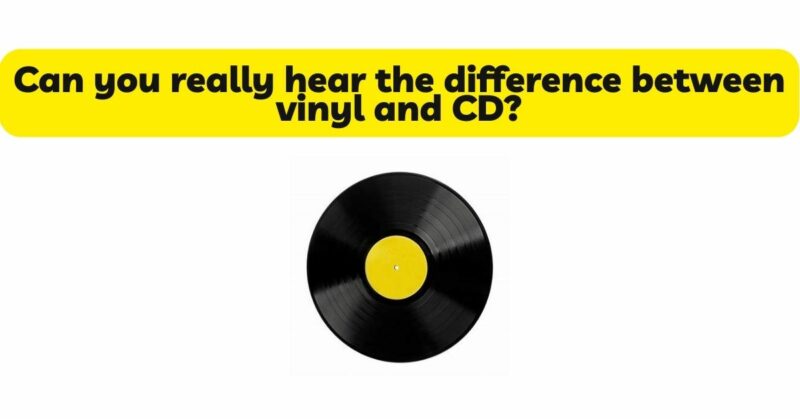In the realm of music enthusiasts, the debate between vinyl records and compact discs (CDs) has been ongoing for decades. Both formats have their passionate supporters who claim that their chosen medium offers the ultimate listening experience. While advancements in digital technology have made CDs the dominant medium for music consumption, vinyl has experienced a resurgence in popularity in recent years. But can you really hear the difference between vinyl and CD? In this article, we will explore the characteristics of each format and examine the factors that contribute to the perceived disparities in sound quality.
Understanding Vinyl Records:
Vinyl records have a rich history and hold a special place in the hearts of audiophiles. The analog nature of vinyl allows for a warm and organic sound that many enthusiasts find appealing. When a vinyl record is played, the stylus picks up the physical grooves on the disc, translating them into electrical signals that are then amplified and reproduced as sound. This process of physical interaction between the stylus and the record creates a unique listening experience that is cherished by vinyl aficionados.
The Charms of Compact Discs:
On the other hand, CDs are a digital medium that revolutionized the music industry in the 1980s. CDs utilize a digital sampling technique, capturing audio as a series of 44,100 samples per second and converting them into digital code. This method allows for accurate reproduction of the original recording and minimizes the degradation that can occur in analog formats. CDs provide a consistent sound quality, free from the crackles, pops, and surface noise associated with vinyl records. Additionally, CDs are more durable, portable, and easier to skip between tracks compared to vinyl.
Perceived Differences in Sound Quality:
The debate about the perceived differences in sound quality between vinyl and CD is multifaceted. Some listeners argue that vinyl produces a warmer and more natural sound due to the analog playback process. The unique imperfections of vinyl, such as slight pitch variations or surface noise, are considered by some to contribute to a more immersive and authentic listening experience.
Conversely, proponents of CDs highlight the format’s superior dynamic range, clarity, and absence of background noise. CDs offer a precise reproduction of the original recording, providing listeners with a cleaner and more accurate representation of the music. The digital nature of CDs also ensures consistent sound quality across multiple plays, unlike vinyl, which can be susceptible to wear and tear over time.
Subjectivity and Personal Preference:
It is crucial to acknowledge that the perception of sound quality is highly subjective and influenced by individual preferences, playback equipment, and listening environments. Some listeners may prefer the warm and nostalgic sound of vinyl records, while others may appreciate the accuracy and clarity of CDs. Factors such as the quality of the turntable, cartridge, speakers, amplifiers, and even the room acoustics can significantly impact the listening experience for both vinyl and CD formats.
The Importance of the Listening Environment:
Creating an optimal listening environment is essential for accurately discerning the differences between vinyl and CD. Factors like ambient noise, speaker placement, and room acoustics play a significant role. Audiophiles who invest in high-quality audio equipment and meticulously designed listening spaces are more likely to notice subtle nuances between the two formats. However, for casual listeners using average consumer-grade equipment or less controlled environments, the differences may be less noticeable or even negligible.
Conclusion:
The debate between vinyl records and CDs continues to captivate music enthusiasts around the world. While both formats offer unique characteristics and listening experiences, the perceived differences in sound quality can vary depending on personal preferences, equipment quality, and listening environments. Vinyl records provide a warm and organic sound that appeals to those seeking a nostalgic and immersive experience, while CDs offer precise reproduction and consistent sound quality. Ultimately, the choice between vinyl andCDs boils down to personal preference and the listening experience one seeks. Whether you are captivated by the charm of vinyl or prefer the accuracy and convenience of CDs, both formats have their merits and can provide enjoyable musical experiences.


